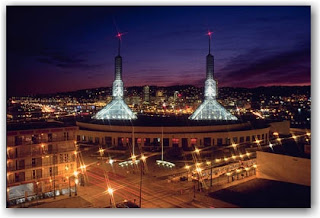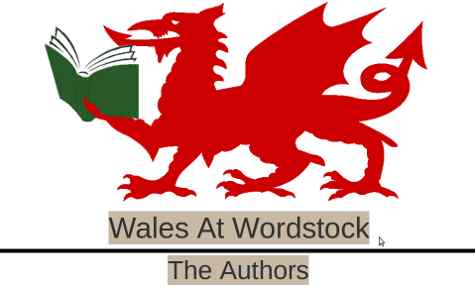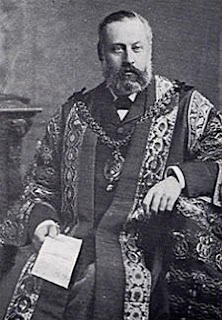Blogs
The Authors
Check the Wordstock blog here daily for posts by our featured authors. Find details of featured authors in the slideshow above .
The Panel Discussion
Featuring - Harrison Solow, Chris Keil and Niall Griffiths.
From 'Mr Vogel' by Lloyd Jones - When was Wales? Wales has never been, it has always been. he rambled on to his next victim, Myrddin the schizophrenic, who fortunately) was asleep. Ill tell you something for nothing. he said, true Wales is never more than a field away, and true Wales is always a field away, like Rhiannons horse in the Mabinogi. Got it?
We asked our panelists to respond to the followowing question:- How do you think Welsh writers, writing in English, contribute to establishing a distinct Welsh cultural identitiy. Do you think there's anything unique about the Welsh experience or about Anglo-Welsh literature in this regard? Here are their responses:-
Niall Griffiths - "Difficult to answer briefly .Let's just say that the less power London has, in every realm, the better for the UK and Europe and indeed humanity as a whole. Wales is bi-lingual, and gloriously so; being able to mediate the world through two languages is very beneficial and enriching."
Harrison Solow - "There is everything unique about the Welsh experience. I have said in various interviews about my writing about Wales that "no word equals its referent, and that the meaning of what is approximated in words lies in the shadow of them in a different realm altogether." I believe "there is a meaning in any experience described within a book, that cannot possibly be in the book." Nowhere have I seen this belief personified, indeed, living, except in Wales: The Welsh have survived as a nation chiefly by cunning and reserve...they play for time, they fence, they scout out the situation, but they do not commit themselves. Those sweet smiles are sweet, but they are well under control. It is performance that greets you, polished and long practiced, played on a deceptively cosy stage set with brass pokers by the fire... as Jan Morris says in her book A Matter of Wales. This is a mystical nation and the daily life of y Cymry remains a mystery to outsiders, some of it even to fellow Welshmen who do not speak Welsh and whose intrinsic and amorphous content is shaped by what is considered by some to be an alien form: English. My significant encounters in Wales have been with the Welsh speaking Welsh, whose intermittent appearance behind those smiles have both an I-Thou magnetism and a faint but discernable invitation; whose bland and wordless gazes bespeak the language of a somehow recognizable teulu (family) that sent me hypnotically to the Welsh Department of The University of Wales to embark on a journey of another kind: the lifelong acquisition of an ancient, bardic tongue. But when I won the Pushcart Prize for Literature for writing about Wales, even those Welsh speakers celebrated the notion that it is possible to write about Wales in English. I'm not so sure that one can write Wales without Welsh. But one can write about it. Wales is a state of mind, or rather a state of heart. It is the scent of lanolin in the air the hum of small cities in the loam beneath the oaks, the conviction of Celtic blood. It is an endless and sirenic song - as far from English sensibility as it is from German or Cherokee. Sometimes I think that any story about Wales should be told outside the written word. It is only because I cannot sing or paint that I write and what I write is a word-performance. It is eisteddfod."
The Workshops
The Writing Life: A Serious Pursuit of Self Definition - Harrison Solow ( OCC room B118 Saturday 9th Oct 9-10.15 am )
What is inspiring to one writer is debilitating to another. In this seminar, each of us will determine what the writing life means for us and thus propel ourselves further into it. Students will be given practical, personal advice and reference material to take away.
Writing Dialogue in the Novel - Chris Keil ( OCC room B119 Sunday 10th Oct 1.30- 2.45 )
The workshop contains lecture, discussion, examples and participation in writing, on technical characteristics of dialogue in order to intensify mood, compress/express social/emotional connections etc
STOP PRESS: Author Lorin Morgan Richards will be joining us at our booth at Wordstock where he will be selling and autographing copies of his works throughout Saturday and Sunday.
...
Twin Town is a 1997 black comedy film made and set in Swansea, south Wales. The film was co-written by Paul Durden and Kevin Allen and is the most successful Welsh film ever made in commercial terms. It has enjoyed enormous success both inside and outside Wales and occasioned a fair degree of controversy. In this interview Paul Durden speaks to Americymru about the film and shares his outspoken views on contemporary Welsh politics. For a selection of clips from ''Twin Town'' go HERE .
.
...

Paul: Twin Town on it’s day could be set in any Town in the U K. It’s just a universal tale of vengeance, just a story of how two dysfunctional lads come to terms with there families murders by the police and how they deal with it the only way they know how. Personally I feel the Lewis Twins subconsciously identified with the feelings and aspirations of a lot of Republican families in Northern Ireland who were being beaten up and murdered in there own homes by the British Army.
Americymru: How did it feel to see the completed film the first time?
Paul: To be perfectly honest, and I’m usually not. Without a shadow of a doubt. In a Nutshell, Absolutely, Stunningly, Passionately, Outstandingly, F***ing Brilliant.
Americymru: We read that there is a sequel to ''Twin Town'' currently in preparation. Care to tell us any more about that? How far advanced is the project?
Paul: Ask me this time next year. If any of us still exist then?
Americymru: You co-wrote "Twin Town" with Kevin Allen - Have you worked together on any other projects?
Paul: Me and Kevin go way back, a long way back, in the past we had collaborated on a few unsuccessful projects that never came to any real fruition. Our relationship is far more social than a work based friendship, it has more to do with hanging out together, binge drinking, showing off, and arguing about things that we both have major hang-ups about.
Americymru: It has been said that ''Twin Town'' is a movie about the Welsh ''underclass''. Do you think that is a fair description and how do you feel about the term ''underclass''?
Paul: Underclass is a word that does not strike any bells with me. If you mean poor, only this week research has revealed that over the last 40 years in the UK the rich/poor pide has widened. What hope is there of any social change and progress by us putting our faith and aspirations in politicians, all the evidence seems to prove that they can only feather there own more than comfortable nests. What a load of greedy self centred privileged bastards. But that is just my personal opinion.
Americymru: Liberal Democrat MP David Alton described ''Twin Town'' as - "sordid and squalid, plunging new depths of depravity". How do you respond to such ''criticism''?
Paul: For once in this creeps pathetic little life I think he is being fairly honest. The Liberal tradition in the UK is one of longer chains and bigger cages for us the masses, in the old days Liberals were federalists and free thinkers. Now they will do anything and pull any strokes just to get a mere smell of political power. I piss on there power hungry lust. As my farther once told me. Liberals are just an organized bunch of don’t knows.
Americymru: Do you think that historically Wales has been fairly or accurately represented in film?
Paul: How Green was my Valley, was made in Hollywood, and it must be set in the only place in the world where they can have a coal pit/mine resting on the top of a hill. All coal mines to my knowledge are to be found in valleys. I do like the Paul Robison film “This Proud Valley” which was made in Wales, before the USA government prevented him from leavening the Land of the Free because of his political leanings. Also the Peter Sellers, Mai Zeterling film “Only Two Can Play” set in Swansea, made in 1962. Written by Kingsly Amis. On a more modern note anything by Karl Francis, the little Devil.
Americymru: You have, from time to time, been an outspoken critic of the political status quo in Wales. What if anything do you think the Senedd has acheived for the people of Wales?
Paul: Sweet F*** All……For once in our lives we got rid of all the Tory MPs, Then what happens the Welsh Assembly bring in proportional representation, and bring them all back in. What a laugh. Then to cap it all they change there name to Government, what a f***ing palaver. But what really summed it all for me was when Rodri Morgan our leader went to the Queen mothers funeral. What for, was he Kowtowing or what, pray inform me, pleases.
Americymru: What is your writing process? How would you typically go about writing a script?
Paul: Have a few beers, roll a few joints, take a few Quaaludes “ Gorilla Biscuits”, put the kids to bed, watch the Big Labowski on DVD. The go for it……..to be continued.
Americymru: Are you involved in any other writing projects at the moment?
Paul: Yes thank you, nice of you to ask.
Americymru: Any final message for the members and readers of Americymru?
Paul: Yes, make damd bloody shure that your President gets the health care bill through Congress. It could change the whole face of the USA and how it is seen by the rest of the world. Good Luck, and try to cut back on the hunting….
Americymru: How''s your vindaloo?

The above article illustrates well the monstrous nightmare that our welfare system has become. A great and humane idea has been abused and misused.
FREE HIGH QUALITY MP3 DOWNLOAD! - Click on my Marcato Musician profile, scroll to bottom of page to 'Downloadable Files' and click on "Reality" (then right click and 'Save As')...easy!
My Company is offering a limited number of investment opportunities for our latest production. "Toy Soldiers" is a short film about the human cost of the continuing conflict in Afghanistan. The short will be filmed in South Wales in September and we are currently raising the production budget through product placement opportunities.
We are seeking a maximum of THREE investments of 5,000 plus a small number of 1,000 investements from UK-based companies and individuals. We have identified 8 film markets and festivals that we will target as routes to market, as well as potential television broadcasters in 15 countries and a number of online platforms.
Please message me to request a copy of the Investment Pack detailing the Proposal and ROI. Serious enquiries only.
Regards,
Daniel Lyddon
Company Director
Seraphim Pictures

Its fairytale appearance belies the history that the building contains in its stones. There has been a fortress on the site since the end of the 11th century when an earth and timber motte castle was built there by Norman lords to defend their land. Both Ifor Bach and Gruffud ap Rhys are two Welsh rulers of Senghennydd whose names are linked to the castle.
During the 13th century, the de Clare family, the Norman lords of Glamorgan made great gains against the Welsh in the upland regions of their disputed territory. It was during this time that it is thought the castle was reconstructed into a stone one, with a small oval courtyard with three circular towers. It was probably Gilbert de Clare (the builder of Caerphilly Castle) who added the towers in the 1280s. It is the spur buttresses at the base of the round towers that suggest it was of Norman design, but it seems that the castle was abandoned in 1316 after Llewellyn Bren led an army against the de Clares in 1316. It was never repaired and the castle fell into ruin.
In 1872, Bute began his project of Castle Coch by asking Burges to look into the possibility of restoring the castle. Burges produced the report and work began in 1875. The castle was to be transformed into a summer home for the Marquess. The restoration was a complete one, but Burges was not to see the finished article. He died in 1881, ten years before completion of the work. His detailed drawings of the interiors allowed his team of craftsmen to complete the task without him. It took sixteen years for the castle to be transformed into the building we know and recognise today.
The castle may have an authentic medieval look to the exterior but the interiors are Victorian fantasy, richly decorated and highly imaginative. After a visit to Castell Coch, it is worth visiting nearby Cardiff Castle to see the ultimate example of the collaboration between Lord Bute and William Burges. At the time of completion, the castle represented a medieval structure, but it did have all the modern conveniences of its time - flushing toilets, central heating and a working kitchen made it habitable. Burges also left behind some justifications for his use of the conical towers, which some historians question for authenticity. Burges wanted them simply for visual effect.
The Keep Tower, the Well Tower and the Kitchen Tower incorporate a series of apartments; of which the main sequence, the Castellan's Rooms, lie within the Keep. The Hall, the Drawing Room, Lord Bute's Bedroom and Lady Bute's bedroom comprise a suite of rooms that exemplify the High Victorian Gothic style in 19th century Britain. However some of the poorer interior decorations can be attributed to work carried out after Burges' early death in 1881. Some of the painted decoration is based on patterns found in Welsh castles. The Drawing Room and Lady Bute's bedroom have ceilings and wall paintings that are almost equal to the best achieved at Cardiff Castle.
The decoration and even the smallest details - such as the door handles and the window latches were carefully considered. Even some of the walls feature paintings of various animals, including birds, monkeys and squirrels, as well as mythological beings.
The uppermost story of the Keep Tower holds Lady Bute's Bedroom, painted in brilliant colours with gilt and mirrors lighting up the double-domed chamber. Apart from the large bed, the furniture in Lady Bute's Room is simplistic and uncomfortable - a result of Burges determination to keep true to the medieval character of the castle.
In 1950, the 5th Marquess of Bute placed the Castle in the care of the Ministry of Works. It is now administered by CADW on behalf of the National Assembly for Wales.
Castell Coch has made numerous appearances in TV and film productions. Drivers can also spot the magical- looking castle from the M4 as they pass the Coryton Interchange.
I bought this book (published by Gwalch) at the Eisteddfod. I was interested to see that Abraham Lincoln and John Adams, amongst other politicians and military people, had Welsh ancestry. Obviously, George Bush Jr is not included; as you may recall, he asked Charlotte Church which state Wales was in.
Still on the subject of books, anyone visiting Caerdydd might like to go to these two bookshops: The Wellfield in Wellfield Road, Roath (No. 58 bus from the centre of Cardiff) and Y Caban at 169 King's Road, Pontcanna. To get to the latter, you can take any bus that goes up Cathedral Road from the centre of town and there's a stop near to King's Road (rather a pleasant street).
All the best
Gaynor






